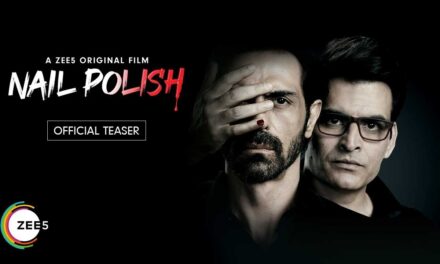Director: Prateek Vats
Cast: Shardul Bhardwaj, Nutan Sinha, Shashi Bhushan, Naina Sareen, Mahinder Nath
Pateek Vats’ Eeb Aalay Ooo first caught my attention when it got picked to be screened in the Panorama section of the prestigious Berlin film festival earlier this year. Having had its world premiere at the Mumbai film festival (JIO MAMI) towards the end of last year, it has since been making waves across the global film community.
I finally had the chance to watch this film, thanks to the We Are One film festival that is currently streaming on YouTube. We Are One is a collaborative effort between twenty global film festivals and aims to raise money for the Covid pandemic by screening specially curated films online over a ten-day period (May 29-June 7). If you are also a film buff like me, you should definitely go and check it out as it’s a chance to catch some unique films we might normally not have easy access to in India.
Eeb Aalay Ooo opens with a ‘Special Thanks’ to ‘All the monkeys of Lutyens, Delhi’. For those not familiar, Lutyens is an area in Delhi that houses most ministers and Government officials and is also home to various ‘Bhavans’ or Government departments. Before you ask or start making satirical connections, the film actually uses a genuine daily menace as the vehicle to deliver a profound social discourse.
The monkey menace in and around the Lutyens area is a real thing and in fact, stories of monkeys invading the homes of ministers and even the Parliament building isn’t uncommon (just Google it). “They have been treated as Gods from time immemorial and put on a pedestal. This has now made them too demanding and totally unchecked”, says a voiceover, about the…err, monkeys.
The chief protagonist in the film is a man named Anjani (the name has a close reference to Hanuman, the monkey God). Anjani is a migrant who has just moved into Delhi and for lack of any better qualification or skill, gets drafted into what I would like to call the MCU of Lutyens (Monkey Control Unit). The job of this team- make monkey noises (Eeb Aalay and Ooo) and chase chimps away from the aristocratic neighbourhood.
It’s fair to say that Anjani hates his job. Try as he might, he can’t even beat the chimps at stare-downs, leave alone chase them away. He feels his voice isn’t loud enough (satire alert). He is given a catapult but isn’t allowed to use it, as animals obviously aren’t to be physically harmed. He tries to figure other ingenious ways, including a couple of really hilarious ones that involve Langurs. But ultimately, he fails. There is a beaut of a scene that sums it all up, where he gets himself inadvertently locked up in a cage meant to catch the monkeys. He is desperate to escape but his thuggish colleagues won’t let him. He has had enough of this monkey business. He wants out.
Things aren’t great for Anjani at home either. He lives with his pregnant sister, and her husband who is a security guard. They struggle to make ends meet and battle with poverty on a monthly basis. It also doesn’t help that Anjani never gets his salary on time. Their access to healthcare is poor and his sister suffers from severe iron deficiency that could potentially harm the baby too.
The cinematography by Saumyananda Sahi works brilliantly in capturing the major class divide that is apparent here. We see wide landscape shots of the grand aristocratic buildings of Lutyens and then, the editor Tanushree Das cuts to Anjani’s home where we are served cramped and often dim close up shots as a reality check. The background score is also used sparingly and instead, the circadian sounds of Delhi are used to create an atmospheric feel about the scenes.
Eeb Allay Ooo results as one of those rare gems that blends humour and satire brilliantly to deliver a heavily loaded social message about governance and inequality, without weighing you down as a viewer. The dialogues are crisp and the screenplay is economical. There isn’t a single device that doesn’t fit into the overall vision and there is not one dull moment as the story unfolds.
The film conveys magnificently how we need to keep evolving as a society and not regress back towards the ways of our primate ancestors. This is possible it argues, only if we help families like those of Anjani’s get poverty and other proverbial monkeys permanently off their backs.
Overall rating: 4/5









